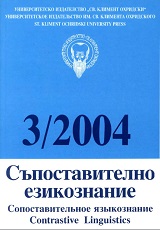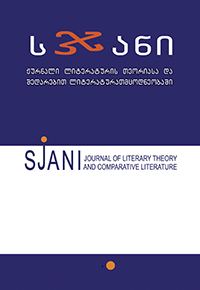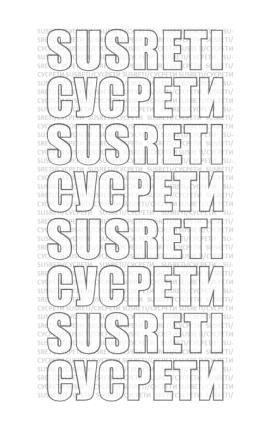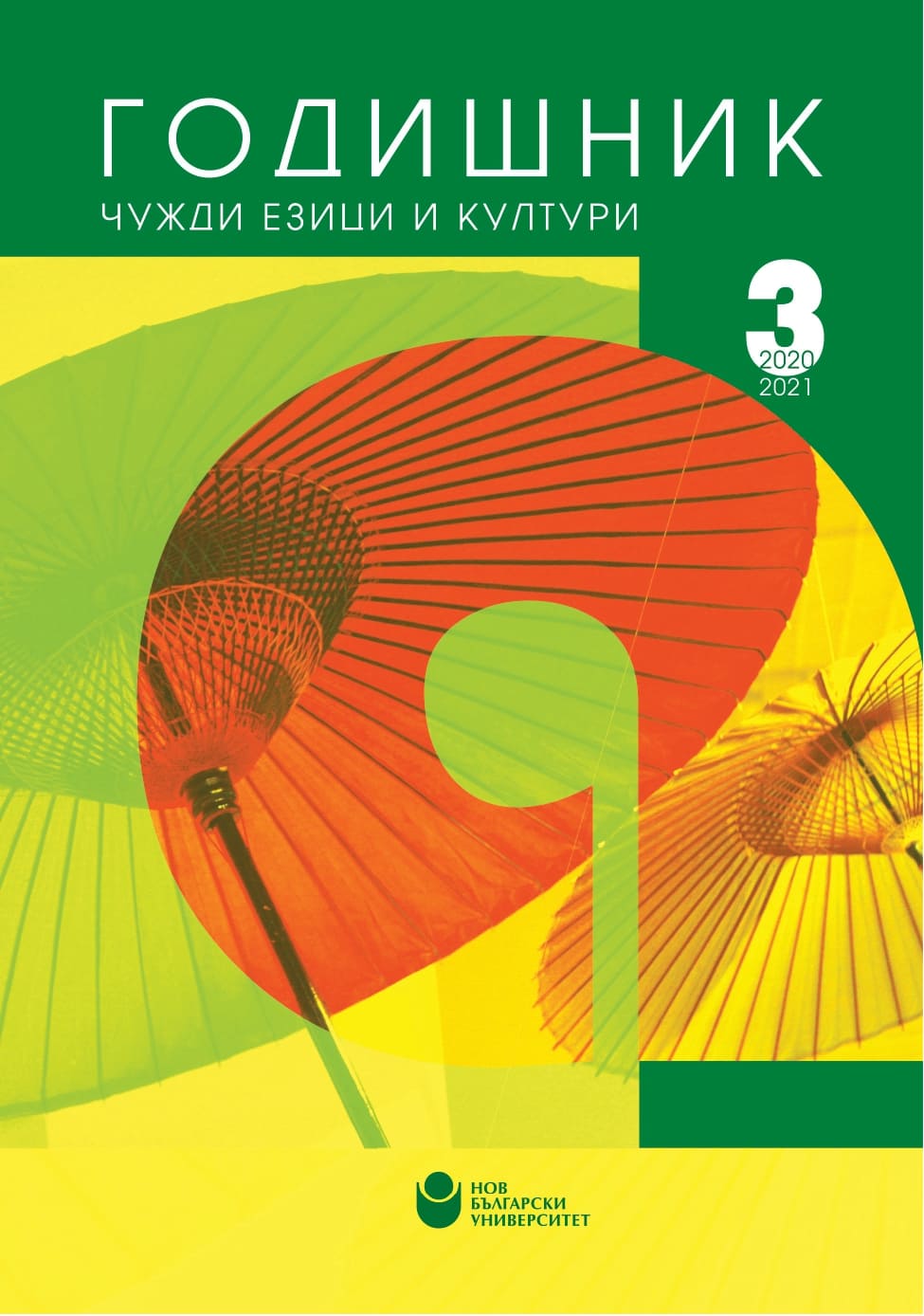
We kindly inform you that, as long as the subject affiliation of our 300.000+ articles is in progress, you might get unsufficient or no results on your third level or second level search. In this case, please broaden your search criteria.


Review of: A. Link е, M. Nussbaumer, Р. R. Portmann. Studienbuch Linguistik (erganzt um ein Kapitel Phonetik und Phonologie von U. Willi), 4., unveranderte Auflage [Reihe Germanistische Linguistik; 121 : Kollegbuch]. Max Niemeyer Verlag, Tubingen, 2001. 463 стр.
More...
Review of: М. Golden. Teorija opisnega jezikoslovja : 1. skladnja. Filozofska fakulteta Univerze v Ljubljani, Ljubljana, 2000. 253 стр.
More...
Review of: R. Benacchio. I dialetti sloveni del Friuli tra periferia e contatto. Societa Filologica Friulana. Udine, 2002. 196 стр.
More...
Review of: М. Пацева. Антропологичен поглед към езика. София, „Парадигма“, 2004. 203 стр.
More...
Review of: Н. Ehrismann-Klinger, R. Pavlova. PONS Powerkurs für Anfänger Bulgarisch / X. Ерисман-Клингер, P. Павлова. Свръхинтензивен курс по български за начинаещи. Ernst Klett Sprachen GmbH Stuttgart, ПОНС България ЕООД, София, 2003. 207 стр.
More...
Review of: Е.В. Урысон. Проблемы исследования языковой картины мира. Аналогия в семантике. [Studia Philologica, Языки славянской культуры.] Москва, 2003, 223 р.
More...
Zaira Arsenishvili, a Georgian screenwriter, musician and writer, notes in one of her interviews that it always surprised her that when reading Georgian literature of the 20th century, she could not find echoes of the horrific period of Georgian history - repressions – despite the fact that nearly every family in Georgia was directly or indirectly affected by repressions. Zaira Arsenishvili considered that repressions were the main theme of this epoch, and the reflection and reconstruction of repressions in fictional texts was a duty. Under totalitarianism, liberating power is embedded in cultural memory, and in these conditions, a collective identity can only be formed by separation from the possible oppressor, while literature plays the role of a medium of a collective memory in this process. According to Aleida Assman memory is always contracted as it relates to the perspectives and experiences of an individual or group. Placing something in memory is a valuable process, because it is the memory that creates community, but this process is impossible without forgetting. The function of remembering and forgetting is to subdue life. Aleida Assman distinguishes 7 forms of forgetting. The first three forms of these (automatic forgetting, kept forgetting, selective forgetting) are neutral, according to Assman, and serve as a mental filter. The fourth form - repressive forgetting (repressive vergessen) and the fifth one - defensive forgetting (defensive vergessen) have a negative connotation, because in their case, forgetting is an instrument to stabilize an aggressive totalitarian environment and repressive social climate. The last sixth and seventh forms of forgetting - constructive and therapeutic forgetting - are clearly positive and refer to forgetting the traumatic past (Assman 2018: 67-68). Damnatio memoriae condemnation of memory) is a form of repressive punitive forgetting which implies the symbolic destruction of the “enemy”, thereby destroying it. According to Assman, the condemnation of memory is a severe punishment because this act strongly affects and destroys a person’s existence. Those whose names have disappeared from the annals or have been removed from stone monuments, symbolically die a second time. In therapeutic forgetting, remembering is the cure to overcome the burden of history with recognition and remorse, and to leave it behind. It is important for reconciliation and social integration. A common violent history must be overcome, which will be made possible by remembering. Therapeutic forgetting has two phases: 1. Remembering 2. Forgetting. Out of these, remembering means collecting, processing and recognizing past events, while forgetting implies overcoming and distancing oneself for social peace and new beginning.
More...
In 1829, Alexander Pushkin traveled around the South Caucasus before he wrote “A Journey to Erzurum.” He noted in this text that he had left Erzurum and returned to Russia early because he feared the plague. Two years after Pushkin’s journey, Georgian poet G. Orbeliani detailed his travel to Russia in his own dairy, “My travel from Tbilisi to Peterburg”, describing a Russian “soldier” who was afraid of “plague and cholera,” meeting him with a somewhat discriminatory attitude in Ekaterinograd quarantine. M. Bakhtin wrote in “Forms of Time and of Chronotope in the Novel” that the “road” in the novel represented a contact zone where socially, economically, ethnically, religiously, or generationally divergent people would occasionally meet. It can therefore be asserted that travel writing creates certain (e.g., Orientalist) images of the “other.” Also, the scholor points out the function of road as metaphor of life, which is clearly observed in Orbeliani’s diary that crossing the border from Georgia to Russia means a turning point for his life that he may never get back to his homeland. Bakhtin’s study serves as a reminder of other texts, for instance, Georgian writer I. Ch’avch’avadze’s “The Letters of a Traveler.” “I,” the narrator of this work, is an intellectual educated in Russia who encounters a local Mokhevian named Lelt Ghunia on the road. If contact is a principal cause of infection, Pushkin’s and Orbeliani’s examples elucidate that the road precisely denotes the contact zone in the Georgian literature of the 19th-century and earlier eras. The means of human mobility in modern times are no longer restricted to the road. People can now travel through the air, which has quite rapidly spread the COVID-19 pandemic worldwide. Notably, unlike the European countries, the Russian Empire did not hold overseas colonies; instead, it occupied contiguous lands and then connected the center and peripheries of the Empire with roads. Hence, the road is profoundly and vastly significant to discussions of 19th-century Georgian and other literature(s), especially within the expanses of the Russian Empire, and not only in the context of pandemics.
More...
In the artistic text, the actualization of myth leads to the creation of a universal context and interesting relations between the works composed at different times and places. A new meaning is added to the already existing layers of the myth contents, hence, the myth is revived eternally in the literary area. The Symbolist conceptual model is distinguished by a revival of myth. One of the well-circulated images is Narcissus, re-interpreted from the Modernist perspective. The art circles from the Classical period took interest in this myth, which gave rise to its numerous interpretations. In the last century, due to the discovery of the unconscious, a psychological layer was added to the mythological and literary (generally, artistic) tradition of Narcissus. The complex image of Narcissus proved to be greatly inspirational and topical for Symbolist authors as well. In the Symbolist tradition, the image of Narcissus acquired a metaphysical dimension and became a means of self-reflection for artists. From the 19th c. its “moralized interpretations” gradually disappear, the ontological layer of the myth (beauty, arrogance, erotic self-constraint, punishment, moral, etc.) loses urgency and the image of Narcissus becomes related to the issue of identity, the process of self-knowledge, subjectivism (Strauss 1995).
More...
Херој славистичке науке и јунак наше приче не жели да буде први, не жели да буде испред других. Али његови студенти, људи који га слушају и воле и који су упознати са његовим радом - упорно га стављају на заслужени трон. О његово друштво се многи отимају, боре се за разговор, савет, тренутак пажње. Неки људи, који га први пут виде, полете му у сусрет да га загрле и пољубе, као рођеног брата. А он је увек једнако драг, фин и скроман, иако је за сва времена задужио и српски народ и филологију – проф. др Иван Чарота, Белорус у чијим грудима куца српско срце.
More...
The article traces the initial steps of the discipline Cultural Studies in Bulgaria. The first conference convened in Veliko Turnovo by the British Council in 1993 is taken as a conceptual metaphor for the influences on the discipline and the basic principles that inform the theoretical framework of this cross-disciplinary field. Cultural Studies is a relatively new phenomenon in Academia. The first conference in Bulgaria was also the first conference on British Studies to be held outside the United Kingdom, so the inchoative factor operates at various levels. The status of English as a “target” language has long been approved all around the world and the need for knowledge about countries where it is spoken as the official language has long sought and found some degree of satisfaction as Civilisation courses. However, the field of Cultural Studies had never been introduced into the picture of language learning as a rich multidisciplinary project up until that conference. The presentations reveal what Bulgarian academics had developed to contribute and what the invited guests sought to showcase. Thus, the presentations are analysed for the topics and key concepts they apply. The conclusions relate to the scope of Cultural Studies courses, their interdisciplinary nature, and the constitutive principles. Additionally, relevance for courses of philology is proposed, with a view of the fields of graduate employment: teaching and translation.
More...
The legal jargon has various distinctive features which distinguish it from other types of specialized language. The specificity of the legal speech which triggers ‘the legal character of the meaning’ can be described from a double perspective: lexical and morphosyntactic. In this paper, we are doing a review of legal Spanish and Italian languages with emphasis on vocabulary and morphosyntax and aiming at setting a group of reference points that the legal linguistic literature offers us and identifying the linguistic processes in which the legal speech builds its authority.
More...
An incursion into the fascinating world of perfumes by linguistic means, where lexicology and borrowing, semantic and stylistic elements revealed using parallel corpora in translation shows the multifarious ways in which we can research terminology.
More...
New realities impose the need for new language, and the Covid 19 pandemic is no exception. The past two years have witnessed the emergence of a completely novel pandemic-related lexicon that is now part of our everyday linguistic sphere, pervading all the levels of public and private discourse. The Romanian speakers have once again been faced with the necessity to adopt and adapt new terminology as part of the global community affected by the current health crisis. In an attempt to contribute to effective communication, the present paper examines various English terms pertaining to the fields of healthcare, medicine, sociology and politics and their ”official” Romanian counterparts.
More...
This article proposes an analysis of some cases of advertisements localization, falling into two main categories, international brands and generic (natural) products that belong to tradition in some countries but are being spreading in some “new” countries; the prototype is wine. It is assumed that there are two different models of advertisements, product promotion and storytelling, but only this latter will be given more attention. Advertisements will be analysis taking into account either their phonetic aspects or the difficulty of translating them still keeping the identity of the promoted product. This article is more a methodological proposal than an exhaustive typological classification of advertisements localization.
More...
The development of English for Specific Purposes (ESP) competences aims at making students professional knowledge transfer smoothly and actively between their native and second language to facilitate competence and innovation. Our article spotlights the didactic contribution of ESP instruction for the development of the students’ professional competence through e-learning. The present case study shows the e-learning didactic approach to develop knowledge progress through an active language management of ESP texts. It explores and suggests an intensive and extensive on-line instruction of ESP vocabulary through complex language exposure and use. The qualitative analysis of the applied vocabulary acquisition through on-line teaching and learning targets the asset of applied language instruction and it vows, explicitly, for the improvement of Romanian students capacity to transfer and develop professional knowledge actively and produce professional accurate expertise. Our local-size case study focuses on financial English text sample selected for the students in Insurance, finance, banking and stock exchange faculty in the Bucharest University for Economic Studies.
More...
Harper Lee’s To Kill a Mockingbird (1960) remains a timeless work of reference that highlights American social and cultural heritage regarding the issue of race. Lee reveals the character of Atticus Finch as a champion of justice as well as an activist for black people’s social freedom. In this paper, we consider the consistency of Atticus Finch’s moral message as he seeks to change American sociocultural consciousness. His participation in building a society of equity and justice is unparalleled and requires a change of perspective concerning cultural diversity to preserve social bounds.
More...
The English used in the European Union for negotiation purposes is often referred to as distinct form commonly called “Brussels English”, “Euro-English” or even “Eurospeak”. The article analyses the arguments for a self standing profile of English used for EU purposes and the prospects of its further development after the United Kingdom’s leaving the European Union(BREXIT) considering its severe under representativeness of native speakers in the EU.
More...
Review of: Linda Hutcheon, O teorie a parodiei. Învățăturile formelor artistice ale secolului XX. Traducere: Oana-Celia Gheorghiu, prefață: Michaela Praisler. Brașov: Editura Universității Transilvania, 2021. ISBN: 978-606-19-1419-7, 130 p.
More...